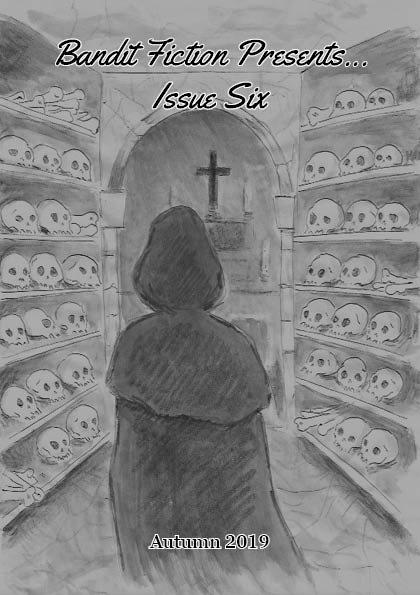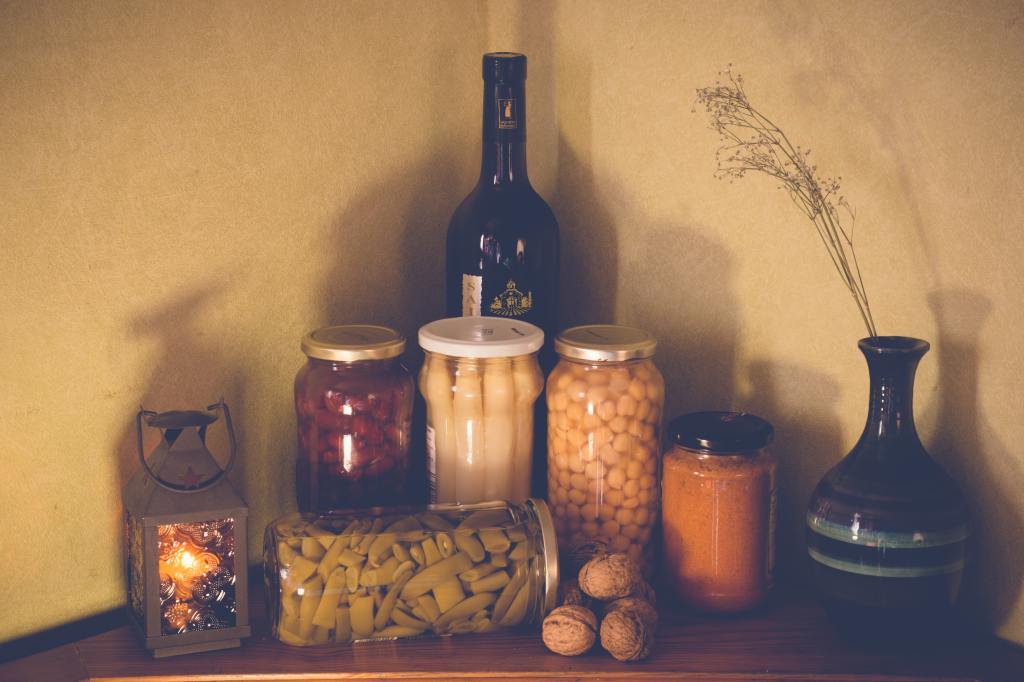
Newlyweds went to a hardware store to get paint for their first home.
“How about this?” The man pointed to a colour called “Artist’s Grey.”
The woman said, “I’d rather get these two: ‘Hey You! Red’ and ‘Reach Out Yellow.’”
“We don’t live in a circus tent.”
“And we don’t live in a prison.”
“This is a very elegant shade of grey,” said the man. “I’d be happy with just one room in this colour.”
“Okay,” said the woman. “You paint the upstairs bathroom Artist’s Grey . . . an elegant colour for the throne room. And I’ll paint the living room the red and yellow. I’ll even throw in some Artist’s Grey.
***
The woman painted the living room walls. One was Hey You! Red, one was Reach Out Yellow, and one was Artist’s Grey.
The man painted the upstairs bathroom walls Artist’s Grey, then hung up a picture of a Ferris wheel.
When he finished, he shut the door, then sat on his throne and admired his work. He opened the window and watched the birds, the neighbour’s children playing on their jungle gym, the passing cars. He also studied a tall tree that grew next to the window. Clusters of bright orange berries burst from the tree’s branches.
The women knocked on the door. “Time to eat.”
He looked at his watch. He’d been sitting there for two hours. “Will you please bring it up and slide it under the door?”
“You can finish after. We even have triple berry pie for dessert.”
“I’m sorry, but I’m not quite done in here.”
***
Later that night, the man stared at his Artist’s Grey walls and listened to the sounds outside his window: crickets, wind, the peeling of cars, dogs barking, children playing. Smells drifted in: fresh air, clipped grass, lilacs, even a trace of blacktop. And for a few minutes, he could smell laundry detergent. He remembered the backyard of his childhood home.
The woman knocked on the door again. “I’m going to bed. Are you coming?”
“Let me just . . . in a minute.”
“Fine. Then you’re done in there. Okay?”
The man lay on the bathroom floor and stared at the ceiling. It was white. Tomorrow, he thought, I will paint the ceiling Artist’s Grey. He fell asleep.
***
The next day, some neighbours came over. They brightened when they saw the room the wife had painted.
One neighbour gestured toward an Artist’s Grey accent. “It makes the red and yellow seem brighter.”
“The grey was my husband’s idea.”
“Is he home?”
The woman glanced at the stairs. “He’s working.”
Later, the woman knocked on the bathroom door. “The neighbours are here. Come down and see them.”
“Next time, I’ll show them this room.”
“Show them now.”
The husband looked up at his Artist’s Grey ceiling and smiled. “They might not get it.”
“I’m going back down. Come down. Please.”
He plucked an orange berry from the tree just outside the bathroom window, then held it against the grey wall. The berry was as orange as an extension cord. He stared at the berry the entire time the neighbours were there. Their laughter angered him. He said, “I will write a poem about this berry.”
***
At the end of the week, the man still had not come out of the bathroom. He continued working on the berry poem. Kids were playing outside. He stuck his head out the window. “Hey, I’m working in here!”
Later, the woman came to the door. “The trees are starting to change. Let’s go see them.”
The man rolled the orange berry between his fingers.
“Let’s go for a walk,” she said. “We can see the trees. Now is the time.”
“I can see.” He had just finished painting the floor Artist’s Grey.
***
Two months later, Artist’s Grey covered the bathroom counters, cabinets, and shelves. The man had not left.
The woman pounded on the bathroom door (also Artist’s Grey). “Let’s go see some lights tonight.”
The man squinted at his unfinished poem. “This is the light.”
“No. The holiday lights, I mean. It’s a perfect night.”
The berry had started to lose its brightness. “I’ll show you perfect. I just need a little more time.”
***
Every day, the woman tried to get her husband to leave the bathroom. And each time, he’d ask her to wait. Though she continued to bring him meals, her knocks became louder and less frequent, while her words became harsher.
***
Ten years later, the man sat on his Artist’s Grey toilet and looked at his Artist’s Grey bathtub. He still worked on his poem about the berry, which was brown and shrivelled. Laughter reached him. He looked out the window to see a new generation of children. They ate mulberries from the tree in his yard.
“Hey you,” he shouted. “You can’t eat those. Go on home now.”
One of the children yelled, “But mulberries are good for you.”
“I know that, but you shouldn’t eat them. They’re too beautiful to eat.”
The children smeared mulberry on their faces. A girl shouted, “Look how beautiful we are now.”
***
Twenty-five years after the man first went into the bathroom, he was still in there.
His wife came to the door, like she did every evening, to drop off his dinner. She heard her husband crying. She knocked softly.
“What?” he said.
“What’s wrong.”
“Just slide it under the door. It’s just this poem. It’s so beautiful.”
As he worked on his berry poem, he smelled barbeque and heard the murmur of voices. He stuck his head out the window. His neighbours chatted and laughed, and their children chased one another. Amid them was a woman he recognized. She was older now, but he could still see the young woman he married. “Be quiet,” he shouted. “I can’t concentrate!”
He slammed the window shut, then looked at the Ferris wheel picture. The man opened his can of paint, dipped his paintbrush in, and then smothered the picture in Artist’s Grey.
***
On a summer afternoon fifty years after the man started painting, he sat in his bathroom—it was almost completely covered in Artist’s Grey—and worked on the last line of his poem.
He opened the window. The sky was so blue that it seemed to buzz. Boys swung a red bat. Girls in bright greens and yellows played in a sandbox.
The man tried to finish his poem, but the colours and sounds and smells interrupted him. He plunged his brush into his can of Artist’s Grey paint. Then he stuck the brush out the window and tried to paint the sky, but he could not. He tried to paint the red bat and the bright clothes. He could not. Then he tried to paint the telephone poles and the mulberries. He couldn’t do it. He tried to paint the smells and the laughter. He could not.
He closed the window. The sky’s blue still oozed through the blurry glass. The bat’s red still slashed, and the green and yellow floated and poked.
The man splashed Artist’s Grey paint onto the window. He spread it with his hands until it covered the glass.
That night, the man finished his poem, but the woman never came to the door.
The next morning, he heard a knock on the door.
“Sir? Hello. Sir?” It was a man’s voice.
The man waved his brush, its bristles dripping Artist’s Grey, at the door. “I’m going to change the world in here.”
“Sir, I have bad news,” said the visitor. “Last night, your wife passed away.”
***
Later that morning, the man opened his bathroom door for the first time in fifty years. He shuffled down the stairs and into the room his wife painted. The red wall shouted, “Hey You!” The yellow wall radiated. Then he noticed the Artist’s Grey wall. The colour looked different than how it appeared in the bathroom.
Then the man stepped outside. Children ate Popsicles as orange as the berry he had plucked many years ago. A woman in a white dress held hands with a man in a cotton candy blue shirt.
These were people, and the colours people brought to the world. The man
plucked a mulberry from a branch, then ate it.
***
That night, the man passed away.
***
A week later, the man’s brother and sister came to sort out his house. When they were in the room the wife painted, they spent a lot of time laughing and talking.
But when they went to the upstairs bathroom, they became silent. Artist’s Grey covered everything: the walls, the ceiling, the floor, the shelves, the cabinets, the counter, the tub, the toilet, the window, the picture, and the mirror. Even the lights.
A shrivelled brown berry sat on the counter. Next to the berry sat the piece of paper with the man’s poem, but they could not read the poem, because the paper was covered in Artist’s Grey.
About The Author
Douglas J. Ogurek
Douglas J. Ogurek, the pseudonymous and highly unprofessional founder of the unsplatterpunk subgenre, thinks he’s changing the world . . . one intestine at a time. Unsplatterpunk uses splatterpunk conventions (i.e., controversial/gory/gross/violent subject matter) to deliver a positive message. Ogurek guest-edited the wildly unpopular UNSPLATTERPUNK! “goretet,” published by Theaker’s Quarterly Fiction. These anthologies are unavailable at your library and despised by your mother. Ogurek reviews films and fiction at that same magazine.
Publications have rejected Ogurek’s work more than 1,500 times. However, The Paris Review, considered one of the world’s leading literary journals, thanked him for submitting a manuscript in one (form) letter. Another highly respected journal, The Yale Review, stated, “We want to thank you for your kindness in letting us see your work.” Thus, Ogurek is a kind author.
Bandit Fiction is an entirely not-for-profit organisation ran by passionate volunteers. We do our best to keep costs low, but we rely on the support of our readers and followers to be able to do what we do. The best way to support us is by purchasing one of our back issues. All issues are ‘pay what you want’, and all money goes directly towards paying operational costs.






















Leave a Reply